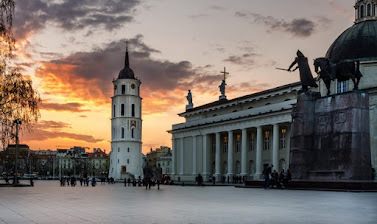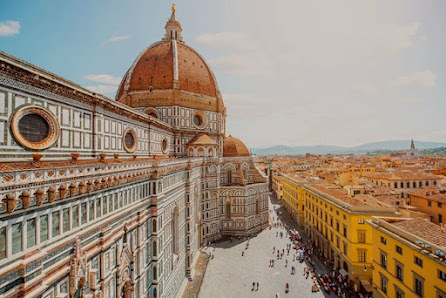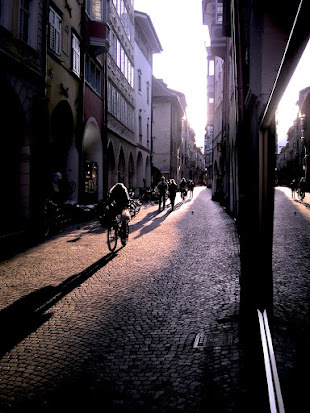Fabrizio Ulivieri's Blog, page 53
April 16, 2023
Vivir al extranjero

Octavio Paz en "El labirinto de soledad" habla del pachuco, un tipo de mexicano que vive en el extranjero, y en un pasaje de este libro en el cual describe el pachuco, reconozco exactamente la misma existencia de mi que vivo fuera de Italia.
"El pachuco ha perdido toda su herencia: lengua, religión, costumbres, creencias. Sólo le queda un cuerpo y un alma a la intemperie, inerme ante todas las miradas. Su disfraz lo protege y, al mismo tiempo, lo destaca y aisla: lo oculta y lo exhibe."
Al final viviendo en el extranjero acabas viviendo en una tierra de nadie, en un no-lugar. Una existencia irreal y casi virtual, en la que experimentas los recuerdos de un país que ya no es real y al cual ni siquiera quieres volver, como el pachuco, que no quiere volver a su origin y tampoco desea fundirse a la vida de la sociedad en la cual vive.
Follow me on Substack

Published on April 16, 2023 11:58
La poesía en el momento en cual nombra crea

Tuve que llegar a Octavio Paz para averiguar algo que no había notado antes. Cuando la poesía quiere subir a la luz, a la superficie para vivir como pide, requiere, en ese momento es tarea del poeta dar un nombre al descubrimiento, dar un nombre a las cosas que descubre en el mismo momento en el cual escucha la voz de la poesía: que es la voz de la belleza, divina, que vive en el hombre. Esta es la lección de Octavio Paz, que me perdí antes de leerlo.
Nombras el árbol, niña.
Y el árbol crece, lento,
alto deslumbramiento,
hasta volvernos verde la mirada.
Nombras el cielo, niña.
Y las nubes pelean con el viento
y el espacio se vuelve
un transparente campo de batalla.
Nombras el agua, niña.
Y el agua brota, no sé dónde,
brilla en las hojas, habla entre las piedras
y en húmedos vapores nos convierte......
Follow me on Substack

Published on April 16, 2023 06:21
April 15, 2023
Disquieting hours

While he was spending his lonely nights in that library, he often imagined being saved by a beautiful girl in a white dress rambling into the reading room and remaining distractedly after closing time and waiting for him; he imagined showing her over the mysteries of the bindery and cataloguing room, then moving with her into the starry night.
It never happened.He had many dreamy moments like those, every night when he worked in the library.
There was a little for him to do. Few students made use of the evening opening; few were even aware of it.The librarians, women for the most part, preferred not to work after five o'clock, because the campus, up on the mountainside, was too bleak and lonely at night. And went they home.It was easy money, what he earned. But the discomfort he suffered was not inconsequential. The loneliness was heavy, the hours he spent there ticked boring. And when no one was there it was even creepy to sit down in the big room with dim lights hanging like candles, turned upside down.Outside the wind was blowing and the dark beyond the window disquieting. He had the feeling he was the only living being on the campus.He lived those bleak hours when he was alone in the fear that an evildoer burst into the room and waylaid him.
It never happened.He had many disturbing moments like those, every night when he worked in the library.
To soothe the fear he used to start remembering the other moments of his boring life at the university.And so he realized, not surprisingly, that all his life was fully immersed in nothing.But also in the nothingness, life is proving something: he was an island; he didn't need parents, he didn't need a family, he didn't need a companion. He was solid like an island but frail like a yellow leaf on a tree's branch in November when the air is iced and the wind blows.
At night, lost in that enormous reading room, he experienced both, adrift in the hollow night, he felt the pain.
Published on April 15, 2023 05:56
April 13, 2023
Italia - a land of idiots

This article stems from a reflection by Massimo Fini [1] on Italian wine. In Italy, there is a widely spread opinion that "wine" is not above all an economic fact but essentially a cultural fact. The article appeared in COME DON CHISCIOTTE [2]. I admit that I can agree, in principle, with Massimo Fini. Especially living abroad, as I live, you realize how many cultural universes surround every act of opening and enjoying a bottle of wine in Italy. How to open a bottle correctly. How long before a bottle must be open, in reference to the year of harvest. The right temperature at which a red or a white must be drunk. Matching wine and food...
But in Fini's article, I also see a lot of the typical Italian arrogance, as in "What do those loutish Americans want to know about wine?"
Fini like almost many Italians (all or almost all) believes, and claims to believe, that what is Gospel in Italy is also the same Gospel in other countries of the world. In many countries, Italian food and wine are just a superstructure with respect to their social and regular cultural structures, because they could live very well without it. An exemplary case is Russia, which due to the sanctions is getting along very well without Italian shoes and Italian mozzarella, indeed it is more prosperous now than before.
In countries where whiskey or beer are the traditional drinks, wine adds little or nothing to their way of conceiving the conviviality between human beings. Like pasta. In Italy, the italioti [3] believe that everywhere pasta is the DISH par excellence. But there are countries where pasta is considered a poor dish, with little nourishment and above all harmful due to the inflammation that the repeated use of flour could cause.
Another point I would like to reiterate is when Fini says "We, Italians, are incapable of promoting our products" to highlight that the economic aspect is secondary to the cultural one. For this reason, according to him, the italioti would not engage in promoting their wines abroad. This is true but is not true at the same time.
A typical feature of the italioti is to grow products just and only for themselves. They love it and put a lot of commitment into making it. Italioti are continuously looking for excuses not to sell. In essence, italioti suffer when they have to deprive themselves of a beautiful and good product. The reason for this must be sought in the mental attitude of the craftsmanship which is at the basis of Italian creativity in food and beverage, entirely focused on creating beauty and quality without ever caring too much about selling, and above all in giving a universal value to his creations when instead it is regional and very often very local: as if, for example, the popular tarallo or fresella from Apulia were expected all over the world and the world could not live without those unique products generated by the Apulian genius. This attitude eventually gets very close to laziness and sloth, and to the inability to get out of one's typically Italian provincialism. Italian mentality is historically a small-town mentality.
But there is another aspect. The ineptitude and unpreparedness of Italian companies to sell abroad (I.e. export). Italian companies have mainly structured their product for the Italian Horeca while abroad, except for a few well-known neighbouring countries (Germany, France, Austria...) the foreign trade is structured for large-scale distribution. So both, the product vision and the final prices of Italian companies are at odds with the vision of foreign large-scale distribution, with their structure and with the vision of prices and quality.
Furthermore, Italian entrepreneurs, even the greatest (there may well be exceptions but I have yet to find them) are fearful, bureaucratic, never ready to sell but always ready to create problems so as not to sell, they are often spoiled by the excessive well-being to which they are accustomed by the internal thriving market that triggered in Italian entrepreneurs (and people) a brazen and arrogant vision, so that they demand to work only with high quantities and on their own terms and conditions that they think they can impose on the whole world. They, who live in a small country that politically speaking is not even independent but directed from abroad, since the end of the Second World War.
At the root of their incapacity is laziness, as I said above, the indolence of wanting to get out of that post-war mentality in which 98% of Italian industry is still fully immersed; the typical refrain is: this is what my grandparents did, this is what my father did and this is how I do and will do ...In Italy. there is a large part of the population so rich that can continue to live as they claim to live for another hundred years without committing themselves beyond the minimum commitment. And in any case, even the less wealthy people in Italy manage to live by inertia in the wake of the flow and lifestyle imposed by the rich classes, working the infinitesimal part necessary and indispensable to live/survive well and without an innovative vision but always old and narrow-minded. Entrepreneurship essentially reflects the typical traits of Italian vices: laziness, indolence, indifference, arrogance, individualism, provincialism, presumptuousness and arrogance, voltagabbanismo [4], and too much being spoiled by well-being which has produced a retarded, idiotic and brainless people (except for a small minority which instead it is of a very high cultural level and preparation but in any case cannot be more than 2%, or 3% if you like to exaggerate).
A good question to ask is: how did Italy become the fourth-world economic power given the quality of its society?
The answer is not easy to be responded to. First of all, it must be said that the Italian population until 1968 (annus horribilis) had other moral and ethical qualities and a different cultural level. But because I know how the world goes, I start suspecting that until 1992 an economically strong Italy was probably convenient for certain powers that move the world. Until 1992, a certain political and economic Italy was convenient to these hidden power that rule the world. Since the fall of the Berlin Wall and the USSR onwards, this Italy was no longer convenient to them and Italy has been reshaped and scaled down, by simply breaking up its political class, devastating its public industry and family-owned business, the backbone of the Italian economy, and abandoning it to its own and real social and entrepreneurial skills, above all to the new compliant, submissive and incompetent political class, which since 1992 onwards has worked only for extra national interests and not for the Italian country Italian people.
But the italioti have not understood yet this, and arrogant as they are, they still live in the greatness of their past and blindly look at the nothingness and imbecility of their present condition. Italians are a dying folk, close to extinguishing. If Italy is still alive, as a country, it is in fact for its past, for the immense cultural and artistic and landscape heritage it possesses, which is perhaps more valuable than the entire world's gold deposited in a bank vault.
[1] Italian journalist and intellectual
[2] Italian digital magazine
[3] Italiota is from the ancient Greek ᾿Ιταλιώτης, which was a denomination in use among the Greeks, starting from the 5th century. B.C., to designate the Greek colonists transplanted in the colonies of southern Italy (Magna Graecia) and is used in a derogatory way to define the easygoing, simpleton and stupid majority of the Italians who live compliantly without questioning and believe almost everything is told to them.[4] a constantly changing-mind status
Follow me on Substack

Published on April 13, 2023 13:22
April 12, 2023
Italia un povero paese morente e inetto

Questo articolo nasce da un riflessione di Massimo Fini sopra il vino che non sarebbe un fatto economico ma soprattutto un fatto culturale, in COME DON CHISCIOTTE. Potremmo anche in linea di principio essere d'accordo con Massimo Fini. Soprattutto vivendo all'estero ti rendi conto di come attorno ad ogni atto di aprire e gustare una bottiglia di vino in Italia vi siano tanti universi culturali. Come aprire in modo corretto una bottiglia. Quanto tempo prima aprire una bottiglia, in riferimento all'annata. Temperatura giusta a cui bere un rosso o un bianco. Combinazione vino cibo...
Ma nell'articolo di Fini vedo anche tanta arroganza italica, come in "che cosa vogliono sapere di vino quegli zotici degli americani".
Fini come quasi tanti italiani (tutti o quasi tutti) crede, e pretende, che quello che è Vangelo in Italia sia anche Vangelo negli altri paesi del mondo. In tanti paesi il cibo e il vino italiano sono solo una sovrastruttura rispetto alle loro strutture sociali e culturali, di cui possono fare anche ben a meno. Caso lampante la Russia, che a causa delle sanzioni ha fatto benissimo a meno delle scarpe italiche e delle mozzarelle italiche, anzi è più florida di prima.
In paesi dove il whisky o la birra sono la bevanda tradizionale il vino poco o nulla aggiunge al loro modo di concepire il convivio fra esseri umani. Come la pasta. In Italia gli italioti credono che dappertutto la pasta sia il PIATTO par excellence. Ci sono paesi in cui la pasta viene considerato un piatto povero, di poco nutrimento e soprattutto nocivo per le infiammazioni che l'uso ripetuto di farine potrebbe comportare.
Un altro punto che mi preme ribattere è quando Fini dice "noi italiani siamo incapaci di promuovere i nostri prodotti" per ribadire che l'aspetto economico è secondario a quello culturale. Per questo gli italioti non si impegnerebbero nel promuovere i loro vini all'estero. Questo è vero e non è vero.
Una caratteristica dell'italiota è quella di crescere i prodotti per se stesso. Di produrli per se stesso. Del cercare ogni pretesto per non venderli in quanto si ha dispiacere a privarsi di un prodotto bello e buono. Questo va ricercato nell'atteggiamento mentale dell'artigiano che sta alla base della creatività italiota nel food and beverage, tutta incentrata nel creare il bello e il buono senza mai curarsi troppo della sua commercializzazione, e soprattutto nel conferire un valore universale alle sue creazioni quando invece è regionale e molto spesso localissimo: come se il tarallo o la fresella buonissima e popolarissima in Puglia fosse attesa in tutto il mondo e il mondo non potesse vivere senza quel prodotto unico del genio pugliese. Questo atteggiamento alla fine sconfina nella pigrizia mentale e nella ignavia, nell'incapacità di uscire dal proprio provincialismo, tipicamente italiano.
Ma vi è un altro aspetto. L'inettitudine e l'impreparazione delle aziende italiane a vendere all'estero. Le aziende italiane hanno strutturato soprattutto il loro prodotto per l'Horeca mentre all'estero salvo pochi e noti paesi limitrofi (Germania, Francia, Austria...) hanno tutto strutturato per la grande distribuzione. Per cui sia la visione produttiva che i prezzi finali delle aziende italiane fanno a pugni con la visione della grande distribuzione, la loro struttura e la visione dei prezzi e della qualità.
Inoltre gli imprenditori italiani, anche i più grandi (ci saranno pure eccezioni ma le devo ancora trovare) sono paurosi, burocratici, mai pronti a vendere ma sempre pronti a creare problemi per non vendere, sono spesso viziati dal troppo benessere a cui sono abituati dal mercato interno che ha prodotto un'arroganza che pretende solo di lavorare con alti volumi e alle condizioni che loro pensano di poter imporre al mondo intero. Loro che vivono in un piccolo paese che politicamente non è nemmeno indipendente ma eterodiretto,
Ma non solo. Alla base della loro incapacità vi è la pigrizia, come dicevo sopra, di voler uscire da quella mentalità postbellica in cui il 98% dell'industria italiana è sempre immersa: così hanno fatto i miei nonni, così ha fatto mio padre e così faccio io...In Italia vi è una larga parte della popolazione talmente ricca da poter continuare a vivere come loro pretendono di vivere per cent'anni ancora senza impegnarsi oltre il minimo sindacale. E comunque anche i meno ricchi riescono a vivere per inerzia nella scia del ritmo e stile di vita imposto dalle classi ricche, lavorando la parte infinitesimale necessaria e indispensabile e senza visione innovativa ma sempre vecchia e angusta. Sostanzialmente nell'imprenditoria si riflettono i tratti tipici dei vizi italici: pigrizia, indolenza, menefreghismo, arroganza, individualismo, provincialismo, presuntuosità e arroganza, voltagabbanismo, e troppo benessere che ha prodotto un popolo ritardato, idiota e istupidito (salvo una piccola minoranza che invece è di un livello culturale e preparazione assai elevati ma che comunque potrebbe al massimo arrivare al 2% o al 3% volendo esagerare).
La domanda da porsi è semmai: come fece l'Italia a diventare la quarta potenza mondiale vista la qualità popolo che ha avuto finora a disposizione?
La risposta è difficile. Innanzitutto bisogna dire che la popolazione italiana fino al '68 (annus horribilis) aveva altre qualità morali ed etiche e altro livello culturale. Ma visto come va il mondo viene il sospetto che fino al '92 faceva probabilemente comodo un'Italia forte economicamente, a certi poteri che muovono il mondo. Fino al '92 faceva comodo una certa Italia politica ed economica. A partire dalla caduta del Muro di Berlino e dell'URSS questa Italia non faceva più comodo e l'Italia è stata ridimensionata, semplicemente sfasciandola e abbandonandola alla propria inettitudine sociale e mentale e politica soprattutto.
Ma questo gli italioti non l'hanno capito e arroganti come sono vivono nella grandezza del loro passato per guardare da ciechi alla loro pochezza e imbecillità del presente. Un popolo morente ormai. Se ancora si salva l'Italia, si salva infatti per il suo passato e per l'immenso patrimonio culturale e artistico e paesaggistico che possiede, che forse vale più dell'oro di tutto il mondo depositato in una banca.
Published on April 12, 2023 07:29
April 10, 2023
Il bello nella poesia è in virtù della luce divina

E' interessante notare come Sant'Agostino rimandi tutto ciò che riguarda le strutture del saeculum a una struttura superiore: quella dello spirito. Parlando della preservazione della pudicizia, qualcosa che generalmente si ritiene legata al corpo, e che dovrebbe conseguentemente appartenere al saeculum, ci fa capire che la preservazione della pudicizia corporale non può esistere senza la preservazione della pudicizia spirituale. Nel De Mendacio Liber Unus (VII, 10), Sant'Agostino pone il caso di una persona degna della massima stima che corra da noi in cerca del nostro aiuto e chieda insistentemente che si dica una menzogna perché è insidiata da uno stupratore che solo si potrebbe tenere lontano con una menzogna. Ma dal momento che mentire per Sant'Agostino non è, in nessun caso, ammissibile così risponde: nullam esse pudicitiam corporis, nisi ab integritate animi pendeat; qua disrupta cadat necesse est, etiamsi intacta videatur; et ideo non in rebus temporalibus esse numerandam, quasi quae invitis possit auferri. Nullo modo igitur animus se mendacio corrumpit pro corpore suo, quod scit manere incorruptum, si ab ipso animo incorruptio non recedat.
"Non vi è pudicizia del corpo se non dipende dall'integrità dell'anima, caduta la quale deve necessariamente cadere [anche quella del corpo], anche se quest' ultima sembri rimanere intatta. Non si deve perciò considerare la pudicizia come un elelemento naturale, che possa essere sottratta anche a coloro che si oppongono. In nessuna maniera l'anima deve contaminarsi con la menzogna per venire in aiuto al corpo suo, che sa che rimarrà incorrotto se lo stato di incorruttibilità non venga meno alla sua anima".Che ci dice questo?Ci dice, che anche nel caso della poesia (che è il tema che ci interessa) la poesia si manifesterà nella sua forma, verrà al mondo nella sua forma, che si impone nell'attimo che viene percepita, se, e solo se, si riconosce che la luce interiore che fa riconoscere la poesia, manifestazione del bello umano, è qualcosa che sta oltre la soglia dell'umano, quella soglia [1] di percezione che postula Dio, e che Sant'Agostino ci ha insegnato in molti modi a riconoscere.E' vero che la poesia è espressione del BELLO umano che appartiene al saeculum, ma ciò avviene in virtù della luce interiore divina che porta il bello a manifestarsi come bello, cosa che non tutti possono, perché la maggioranza rifiuta di ammettere che una luce divina vive nell'uomo. Quella luce che è la garanzia del riconoscimento del Bello in sé che partorisce arte e poesia nel momento che viene riconosciuta.Può il demonio partorire il Bello? Ovviamente no, lui fin dall'inizio per suo libero arbitrio [2], ha negato la luce divina ed è decaduto. E chi decade nello stesso modo, attraverso la negazione della luce divina, è impossibilitato a partorire il bello.
[1] Sul tema della soglia nella poesia si veda QUI[2] Sulla decisione del demonio di scegliere il male di sua propria volontà si veda QUI
Follow me on Substack

Published on April 10, 2023 22:53
April 9, 2023
Perché la poesia? Riflessioni sciolte sul tema

Il bisogno di poesia viene dalla vita, da ciò che ti circonda, dai volti, dai luoghi, dalle ore, dal tempo, dal sole, dalla pioggia, dalla neve, dal vento e dal ghiaccio, dalla natura... quando filosofia, finzione e pensiero si dimostrano chiaramente incapaci di rivelare ciò che nemmeno la religione può aiutarci a rivelare: la parte umana che soffre e ha irrevocabilmente bisogno di BELLEZZA, per sperimentare la bellezza che si radica in quello che sant'Agostino chiama saeculum e dove l'uomo lavora, soffre, nasce e muore, odia, uccide ma AMA anche, prima che si diparta.La poesia è quella parte umana, che è proprio l'opposto di quell'altra parte che Dostoevsky ha magistralmente rivelato: la follia.
E quando quella sensazione di bellezza tutta umana, che è concessa all'uomo, come la follia, GRIDA per farsi sentire, per venir su, per sollevarsi, perché gli appartiene, è dell'uomo, e vuole vivere, venire a galla, poi, quando la BELLEZZA chiede una voce per essere detta, e finalmente si impone per venire al mondo per sempre, allora nasce l'arte e nasce la poesia.
Del resto, possiamo definire la poesia come "follia per la bellezza". Non è folle un uomo che scrive poesie a settant'anni?
Ma la poesia è poesia anche quando non va su carta, ma rimane poesia vissuta e sentita, determinata da un momento sotto forma di intuizione, visione, intuizione, che appartiene a tanti momenti della quotidianità umana che ognuno vive, ma molti non la riconoscono e la sopprimono, perché la maggioranza annulla di default la scintilla divina che portano dentro di sé e che viene da Dio e fa loro riconoscere e accettare la BELLEZZA, perché rifiutano Dio e le sue opere e doni.Qui c'è da vedere l'aspetto trascendente della poesia. Quando riconosciuta e accettata, la poesia è la soglia attraverso la quale la bellezza umana guarda, prima di entrare, prima di varcare la stessa soglia e oltrepassare il saeculum. Ma dopo, non è più poesia, è la Città di Dio.
Ma qui, a questo punto, ci fermiamo e concludiamo con le parole di Wittegestein:„Was sich ueberhaupt sagen laesst, laesst sich klar sagen: und wovon man nicht reden kann, darueber muss man schweigen“"Ciò che può essere veramente detto, sia detto con chiarezza: di ciò che non può essere detto, si deve tacere"
Published on April 09, 2023 07:38
Why poetry? Some considerations on the subject

The need for poetry comes from life, from what is around you, from faces, places, hours, weather, sun, rain, snow, wind and ice, from nature...when philosophy, fiction, and thought clearly prove themselves incapable of revealing what not even religion is able to help us reveal: the human part that suffers and irrevocably needs BEAUTY, to experience the beauty that is rooted in what Saint Augustine calls saeculum and where mankind works, suffers, is born and dies, hates, kills but also LOVES before departing. Poetry is that human part, that is precisely the opposite of that other part which Dostoevsky masterfully revealed: folly.
And when that sensation of beauty that is wholly human, which is granted to man, like madness, SCREAMS to be heard, to come up, to rise up because it belongs to him, it belongs to man, and it wants to live. to come to the surface, then, when the BEAUTY asks for a voice to be spoken, and finally imposes itself to come into the world forever, then art is born and poetry is born.
After all, we can define poetry as "madness for beauty" Isn't insane a man who writes poems at the age of seventy?
But poetry is poetry even when it doesn't go on paper, but remains lived and felt poetry, determined by a moment in the form of intuition, vision, insight, which belongs to many moments of human daily life that everyone experiences, but many do not recognize it and suppress it, because the majority hides by default the divine spark that they carry within themselves and that comes from God and lets them recognize and accept BEAUTY, because they reject God and his works and gifts.Here is to see the transcendent aspect of poetry. When recognized and accepted, poetry is the threshold human beauty looks through, before entering, before crossing the same threshold and passing beyond the saeculum. But afterwards, it is no longer poetry, it is the City of God. But here, at this point, we stop and we conclude with Wittegestein's words:
„Was sich ueberhaupt sagen laesst, laesst sich klar sagen: und wovon man nicht reden kann, darueber muss man schweigen“
"What can be said, can be said with clarity: What can't be said, must remain unsaid "
Follow me on Substack

Published on April 09, 2023 01:51
Al cuore mio uguale nemico

(a mia moglie Živilė)
Ti immagino piccola in questa landa di gelo
E il cuore mi duole
Perduta di Dio
I tuoi sospiri le tue paure
La voglia di andare
Via e fuggire lontano
E sognavi l'Italia
Terra promessa
Ascoltavi le sue canzoni
Le sue melodie e i tuoi biondi capelli
I tuoi occhi di ghiaccio
Blu profondi un'ombra
Passava che di esistere temevi
Eterna - incontrare e rimanere
Senza voce.
E mi affaccio a questa stessa
Finestra della camera dove tu Vivevi i sogni tuoi - e vedo oltre quei vetri
Il dolore uguale, che mai muore
E mi guarda anemico ora
Come a te allora - era orribile silenzioso
E pauroso - al cuore mio uguale nemicoTace.
Follow me on Substack

Published on April 09, 2023 00:08
April 8, 2023
Chiudi gli òcchi cuore

Chiudi gli òcchi cuore e il sapore
gustati di caffè amaro - il mondo
che apre la bocca e sveglia te vivo e
rinuncia allo zucchero che uccide.
Il corpo ascolta e la voce che dentro
ti parla - e era vita quando tu
vivevi ma con tanti difetti eri
e tu sapevi l'uomo che abitavi
ed ora più non sei - più non risuona
e ti abbandona a nuovo destino e
certo vai, e più rabbia sai che non hai e
di quiete troppo quiete stanze senza
speranze ormai apri le porte e non credi
che mute aspettano il tuo arrivo
e senza volti cari a salutar vuote
attendono perdute.
Follow me on Substack

Published on April 08, 2023 00:35



